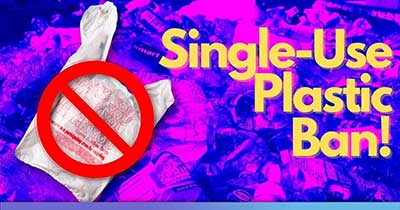Relevance: GS-3: Economic Development, Biodiversity, Environment, Security and Disaster Management.
Key Phrases: single-use plastic, Central Pollution Control Board, Plastic Waste Management Rules, SPCB, Prevention and Control of Pollution Act, 1981,
Context:
- Manufacturing, importing, stocking, distribution, sale and use of single-use plastic, including polystyrene and expanded polystyrene commodities will be banned effectively from July 1, 2022 across the country.
What is single-use plastic?
- It refers to plastic items that are used once and discarded.
- Single-use plastic has among the highest shares of plastic manufactured and used — from packaging of items, to bottles (shampoo, detergents, cosmetics), polythene bags, face masks, coffee cups, cling film, trash bags, food packaging etc.
Do you Know?
- Single-use plastics account for a third of all plastic produced globally, with 98% manufactured from fossil fuels.
- On the current trajectory of production, it has been projected that single-use plastic could account for 5-10% of greenhouse gas emissions by 2050.
- India features in the top 100 countries of single-use plastic waste generation – at rank 94 (the top three being Singapore, Australia and Oman.
- With domestic production of 11.8 million metric tonnes annually, and import of 2.9 MMT, India’s net generation of single-use plastic waste is 5.6 MMT, and per capita generation is 4 kg.
The Items being banned:
- The items on which the Central Pollution Control Board (CPCB) has announced a ban are earbuds; balloon sticks; candy and ice-cream sticks; cutlery items including plates, cups, glasses, forks, spoons, knives, trays; sweet boxes; invitation cards; cigarette packs; PVC banners measuring under 100 microns; and polystyrene for decoration.
- The Ministry had already banned polythene bags under 75 microns in September 2021, expanding the limit from the earlier 50 microns.
- From December 2022, the ban will be extended to polythene bags under 120 microns.
- According to the Plastic Waste Management Rules, 2016, there is also a complete ban on sachets using plastic material for storing, packing or selling gutkha, tobacco and pan masala.

Reasons for Banning These Items:
- Turns into micro plastics: When plastic remains in the environment for long periods of time and does not decay, it turns into micro plastics – first entering our food sources and then the human body, and this is extremely harmful.
- Difficult to collect: They are difficult to collect, especially since most are either small, or discarded directly into the environment – like ice-cream sticks.
- Lower economic impact: The items chosen are of low value and of low turnover and are unlikely to have a big economic impact, which could be a contributing reason.
Central Pollution Control Board (CPCB)
- The Central Pollution Control Board (CPCB), statutory organisation, was constituted in September, 1974 under the Water (Prevention and Control of Pollution) Act, 1974.
- Further, CPCB was entrusted with the powers and functions under the Air (Prevention and Control of Pollution) Act, 1981.
- It serves as a field formation and also provides technical services to the Ministry of Environment and Forests of the provisions of the Environment (Protection) Act, 1986.
- Principal Functions of the CPCB,
- To promote cleanliness of streams and wells in different areas of the States by prevention, control and abatement of water pollution, and
- To improve the quality of air and to prevent, control or abate air pollution in the country.
How will the ban be enforced?
- The ban will be monitored by the CPCB from the Centre, and by the State Pollution Control Boards (SPCBs) that will report to the Centre regularly.
- Directions have been issued at national, state and local levels — for example, to all petrochemical industries - to not supply raw materials to industries engaged in the banned items.
- Directions have also been issued to SPCBs and Pollution Control Committees to modify or revoke consent to operate issued under the Air/Water Act to industries engaged in single-use plastic items.
- Local authorities have been directed to issue fresh commercial licenses with the condition that SUP items will not be sold on their premises, and existing commercial licences will be cancelled if they are found to be selling these items.
- Those found violating the ban can be penalised under the Environment Protection Act 1986 – which allows for imprisonment up to 5 years, or a penalty up to Rs 1 lakh, or both.
- Violators can also be asked to pay Environmental Damage Compensation by the SPCB.
How are other countries dealing with single-use plastic?
- 124 countries, parties to the United Nations Environment Assembly, including India, signed a resolution to draw up an agreement which will in the future make it legally binding for the signatories to address the full life of plastics from production to disposal, to end plastic pollution.
- Bangladesh became the first country to ban thin plastic bags in 2002.
- New Zealand became the latest country to ban plastic bags in July 2019.
- China issued a ban on plastic bags in 2020 with phased implementation.
- As of July 2019, 68 countries have plastic bag bans with varying degrees of enforcement.
- Eight states in the US have banned single-use plastic bags, beginning with California in 2014.
Conclusion:
- Plastic bags affect many people, not only the consumers but plastic bags also affect the environment and animals.
- Hence it is the need of the hour to use alternatives like steel, glass, ceramic, bamboo and forest produce which have the potential to replace single-use plastic.
Source: Indian Express
Mains Question:
Q. Why single-used plastics are being banned in India from July 1 2022? Discuss its economic impact. (250 words).







